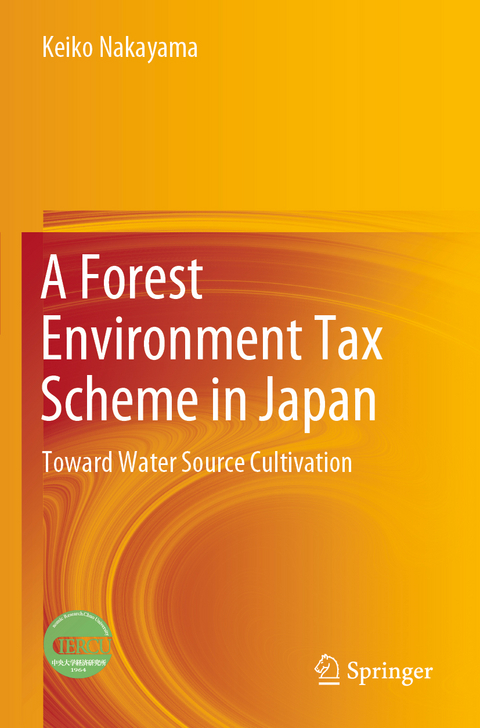
A Forest Environment Tax Scheme in Japan
Toward Water Source Cultivation
Seiten
2023
|
1st ed. 2022
Springer Verlag, Singapore
978-981-16-9354-0 (ISBN)
Springer Verlag, Singapore
978-981-16-9354-0 (ISBN)
Therefore, in order to realize sustainable economic growth, it is necessary to formulate policies for the conservation of appropriate forest environments.
Forest conservation is an especially important policy issue for Japan, where two-thirds of the country is forested.
This book is a work that focuses on the forest environmental tax. Forest resources have played a major role in preventing global warming by absorbing carbon dioxide and supplying oxygen. However, global economic growth has adversely affected the global environment and has exacerbated global warming due to excessive consumption of forest resources. The functions or “services” of forests are diverse, but the interest of the citizenry in forest cultivation is scarce since forests are public goods. Concurrently, Japanese forestry, which has played an important role in forest conservation, is steadily declining, and it is no longer possible for private forest operators to maintain the forest environment. Therefore, in order to realize sustainable economic growth, it is necessary to formulate policies for the conservation of appropriate forest environments.
Forest conservation is an especially important policy issue for Japan, where two-thirds of the country is forested. InJapan, a forest environmental tax is being introduced as a forest conservation policy. As of 2021, the forest environmental tax has already been introduced in about two-thirds of the prefectures and soon will be introduced as a national tax. In this book, the significance and issues of the forest environmental tax will be sorted out, and the status of the introduction of the forest environmental tax in Japan will be compared with that of other countries. In addition, there is additional material regarding the water source conservation fund in Toyota City, Aichi Prefecture, a system similar to the forest environmental tax.
Forest conservation is an especially important policy issue for Japan, where two-thirds of the country is forested.
This book is a work that focuses on the forest environmental tax. Forest resources have played a major role in preventing global warming by absorbing carbon dioxide and supplying oxygen. However, global economic growth has adversely affected the global environment and has exacerbated global warming due to excessive consumption of forest resources. The functions or “services” of forests are diverse, but the interest of the citizenry in forest cultivation is scarce since forests are public goods. Concurrently, Japanese forestry, which has played an important role in forest conservation, is steadily declining, and it is no longer possible for private forest operators to maintain the forest environment. Therefore, in order to realize sustainable economic growth, it is necessary to formulate policies for the conservation of appropriate forest environments.
Forest conservation is an especially important policy issue for Japan, where two-thirds of the country is forested. InJapan, a forest environmental tax is being introduced as a forest conservation policy. As of 2021, the forest environmental tax has already been introduced in about two-thirds of the prefectures and soon will be introduced as a national tax. In this book, the significance and issues of the forest environmental tax will be sorted out, and the status of the introduction of the forest environmental tax in Japan will be compared with that of other countries. In addition, there is additional material regarding the water source conservation fund in Toyota City, Aichi Prefecture, a system similar to the forest environmental tax.
What Forest Environmental Tax is.- Forest Environmental Tax in Japan.- Tap Water Source Conservation Fund.- Forest Environmental Tax in Other Countries.- Optimization of Forest Environmental Tax.- Optimization of Water Source Conservation Fund.- Environmental Tax and Stackelberg Game.
| Erscheinungsdatum | 08.03.2023 |
|---|---|
| Zusatzinfo | 28 Illustrations, color; 7 Illustrations, black and white; X, 126 p. 35 illus., 28 illus. in color. |
| Verlagsort | Singapore |
| Sprache | englisch |
| Maße | 155 x 235 mm |
| Themenwelt | Recht / Steuern ► Steuern / Steuerrecht |
| Wirtschaft ► Volkswirtschaftslehre ► Wirtschaftspolitik | |
| Schlagworte | Forest Environmental Tax • Optimization • Sustainable forest management • Tap Water Source Conservation Fund • Water Source Cultivation |
| ISBN-10 | 981-16-9354-4 / 9811693544 |
| ISBN-13 | 978-981-16-9354-0 / 9789811693540 |
| Zustand | Neuware |
| Informationen gemäß Produktsicherheitsverordnung (GPSR) | |
| Haben Sie eine Frage zum Produkt? |
Mehr entdecken
aus dem Bereich
aus dem Bereich
Theorie und Anwendung
Buch | Hardcover (2024)
Vahlen, Franz (Verlag)
39,80 €
wie sich unsere Wirtschaftspolitik ändern muss, damit wir globale …
Buch | Hardcover (2024)
Wiley-VCH (Verlag)
39,99 €
Eine anwendungsorientierte Einführung
Buch | Softcover (2024)
Facultas (Verlag)
37,00 €


